Moving to Dubai could well be one of the most exciting experiences you’ll ever enjoy.
However, relocating to a new country can be daunting, especially if you lack practical knowledge of how things are done locally.
We’re going to take a look at the pros and cons of living in Dubai, with practical tips on residency, taxes, education, healthcare, and plenty more, including the recent changes that the UAE has introduced aimed at foreign residents.

With our tips, you will know what to expect so you can plan beforehand and make the very most of your new home in the Middle East.
In this guide:
- Dubai’s highlights.
- The legalities of moving: permits and residency options.
- The cost of living: monthly expenses, rentals, and real estate.
- Dubai as a retirement destination.
- Healthcare and education.
- Working in Dubai.
- Buying real estate.
- Driving and using public transport.
- Where to live – an overview of the most popular neighborhoods.
- The pros and cons
- Tips for moving and cultural adjustment.
The highlights
Dubai stands out from the crowd as Expatra’s top destination in the world to make money, and that’s no doubt a major feature that attracts new residents worldwide.
Here’s why this place is such a popular destination:
- Cosmopolitan hub: Multinational and known for its modern infrastructure, luxury lifestyle, and diverse population.
- Tax-free income: Zero personal income tax allows residents to save more and enjoy a higher disposable income.
- Career growth: Sectors like finance, hospitality, tourism, medicine, construction, and technology thrive and offer a good career path for skilled specialists.
- First-class infrastructure: Modern transportation systems, great international connections, fast internet, state-of-the-art healthcare facilities, and top-notch education options.
- Safety and security: Known for its high safety standards, with crime rates well below any other major location worldwide.
- Year-round sunshine: With warm winters and hot summers, it provides ample occasions for outdoor activities like beach outings, desert adventures, and sports.
- Foreigner-friendly policies: The government has implemented various policies to attract and support new residents, including long-term residency options, retirement plans, and sponsorship programs for families.
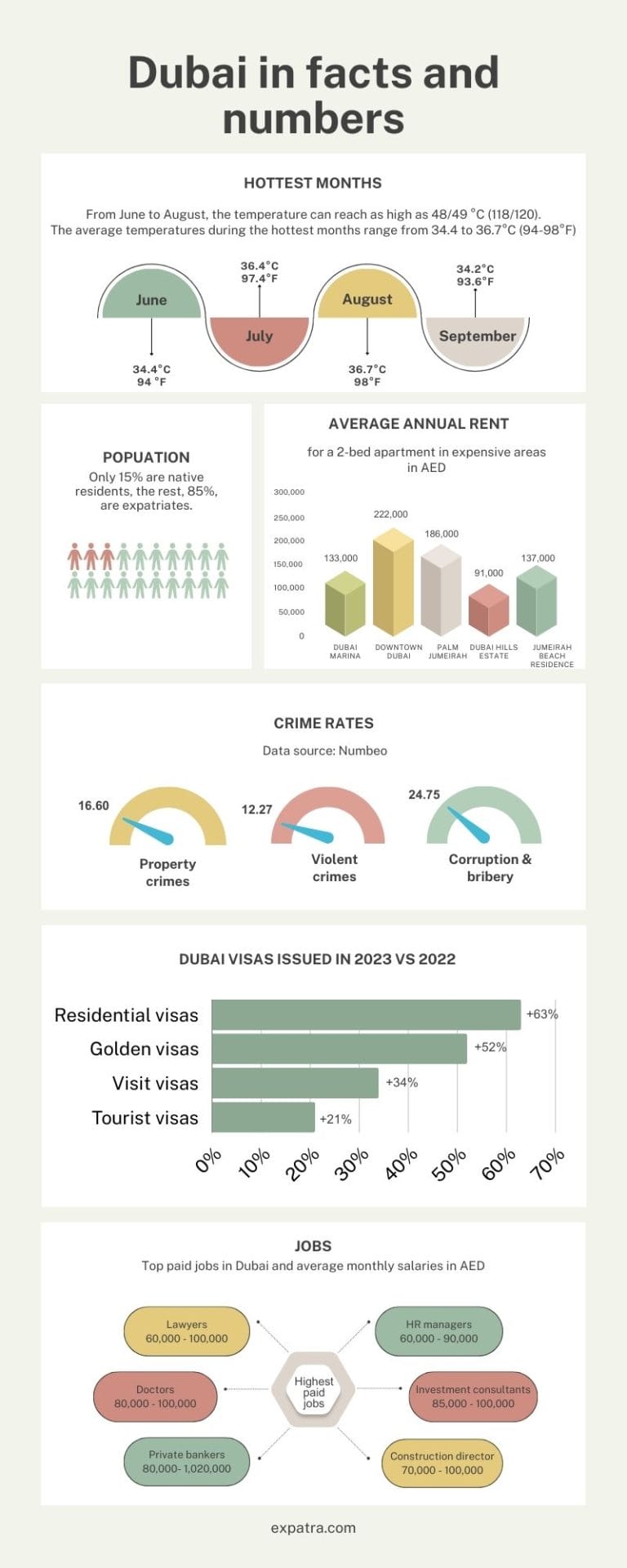
Visas and residency options
If you want to stay in Dubai for up to 4 months without becoming a resident, you have several options of either prearranged visit visas or stamps on arrival.
For a longer stay, you need to apply for a residential permit.
Non-residence visas
Visas on arrival are free of charge and are stamped in your passport at the Dubai airport immigration stand when you arrive.
- British, US, Canadian, and some other nationals can obtain a 30-day stamp on arrival.
- Most European, Russian, South Korean, and some South American nationals can obtain a 90-day stamp on arrival. This is a multiple entry 90‑day visit visa valid for six months from the date of issue.
- Mexican nationals can obtain a 180-day stamp on arrival.
If you need a prearranged entry permit, you can now complete the application and payment online through emirates.com.
Extensions
Most visit visas can be extended.
The maximum stay in the country is 120 days per year. Extensions beyond this period are not allowed.
You can get an extension without leaving the United Arab Emirates.
All types of tourist entry permits can now be extended for an extra 30 days. Extensions from within the country cost approximately Dhs1100 ($300).
Job seeker visa
The new job seeker visa allows you to come to the Emirates without needing a sponsor or host to search for a job.
To apply, you must meet the following requirements:
• Have the first, second, or third skill level as outlined by the Ministry of Human Resources and Emiratisation.
• Be a fresh graduate of the top 500 universities globally.
• Have the minimum educational level of a bachelor’s degree or its equivalent.
The visa is multi-entry and can have 60, 90, or 120 days validity.
Residence visas
The Residence visa allows the holder to reside in the UAE long-term.
Sponsored visas (employment and family sponsorship)
To live and work in the Emirates, you need a sponsor who can be an employer or an eligible relative.
Your sponsor needs to apply for your entry permit and residence at one of the authorized centers in Dubai or an Amer center.
Employment visas are usually issued for a specific job and have limited validity, usually for the duration of the employment contract. You can renew it if you continue working for the sponsoring company and fulfill the renewal requirements.
Long-term residence (Golden Visa)
These are issued for 5-10 years, depending on the eligibility category of the applicant. You don’t need a sponsor.
10-year long-term residence
To be eligible, you must:
- Invest at least Dhs 10 million in the public sector ($2,723,000).
- Or be a person with a specialized talent, such as a doctor, scientist, inventor, specialist, or of special talent in the field of culture and art; medical doctors, as well as engineers of computer programming, electronics, electrical, and biotechnology.
5-year long-term residence
To be eligible, you must:
- Invest in real estate in the Emirates that has a gross value of at least Dhs 5 million ($1,362,000). The money you invest cannot be loaned from someone, and you have to maintain it for at least three years.
- Or be an entrepreneur with an existing project that has a minimum capital of Dhs 500,000 ($137,000).
- Or be an outstanding student who has a minimum grade of 95% in a public or private secondary school or a GPA of at least 3.75 in a university in or outside the country after you graduate.
Retirement visa
To be eligible, you must be at least 55 years old and meet one of the following conditions:
- Purchase real estate worth at least Dhs 2 million ($544,600).
- Have financial savings of at least Dhs 1 million ($272,300).
- Have an active income of at least Dhs 20,000 ($5,500) per month from investments or pensions.
The Retirement permit is issued for five years, and it can be renewed for another five if you still meet the eligibility criteria.
Remote work program
The ‘remote work’ program allows you to go to Dubai and stay there for up to a year working as a self-employed or for your employer based in a different country. So, if you are a member of a digital nomad tribe, this is a great option.
To be eligible, you must work remotely for an organization outside the Emirates and have a monthly income of at least $3,500.
As a remote worker, you can rent a house, have access to schools if you have children, and basically live like a local. You are officially allowed to work. However, you are not allowed to get a job in Dubai.
The application will cost you $287, plus you need to have medical insurance in Dubai.
The cost of living
Dubai is not what you can call “an affordable destination”.
Here is how the cost of living in some major cities across the globe compares to Dubai:
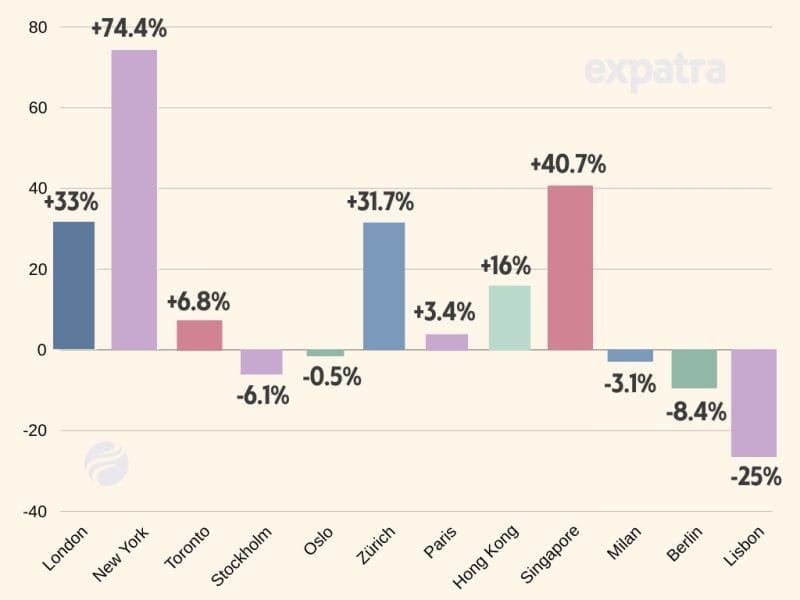
Housing
The cost of accommodation in a popular area can be as much as $28,000 a year for a decent rental apartment in a good location, and very often, this has to be paid upfront.
Here’s the average rent in various areas of Dubai:
| Housing type | Luxury areas | Affordable areas |
|---|---|---|
| Villas | $10,000 | $5,000 |
| Studios | $2,500 | $1,000 |
| 2-Bed Apartments | $5,000 | $2,500 |
Other expenses
Other than accommodation, the other high-cost outlays you need to be aware of include school fees.
Whilst there is a law restricting the annual rate of fee inflation to between 16 and 20 percent, schools find all sorts of ways to add on extras, and this has seen annual inflation of up to 80 percent in what parents have to pay.
The cost of healthcare in Dubai is high, but the quality you get is exceptional.
Here are some major monthly expenses for a couple:
- Rent for a one-bedroom apartment in the center: $1,800 – $3,000
- Utilities (including electricity, water, cooling, and garbage): $150 – $250
- Internet and mobile phone services: $80 – $150
- Groceries: $400 – $600
- Dining out and entertainment: $500 – $800
- Public transportation (monthly pass): $80 – $190
- Medical coverage: $200 – $400
- Fitness club membership: $70 – $150
Even with the introduction of VAT (at a rate of 5%, one of the lowest globally), daily shopping costs are very reasonable.
Dubai as a retirement destination
With the introduction of the retirement visa, many expatriates who have been working and building careers in Dubai can stay here in retirement. This option is also available to non-residents.
According to the Expatra Retirement Index, Dubai is in the top 20 best places to retire abroad.
The index is based on the Expatra Global Retirement Survey that asks international retirees to rate their retirement destination’s infrastructure, climate, ease of settling down, value for money, friendliness, and other aspects of life in their retirement destination.
Here’s how Dubai scores:
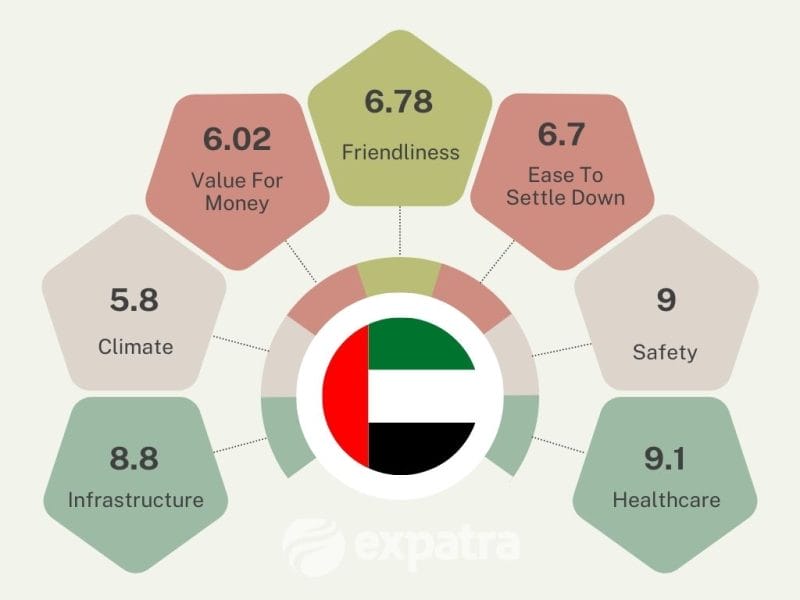
The highlights:
- Safe and highly developed destination
- Zero income tax
- High-quality healthcare
Things to keep in mind:
Summers are becoming too hot for some residents, so they do the reverse to “snowbirding,” leaving Dubai during the hottest months to spend time somewhere more comfortable.
Healthcare
Since the introduction of mandatory medical coverage in Dubai, every resident needs to be insured in one way or another.
Valid medical coverage is necessary to obtain a residency permit.
Hospitals in Dubai are well-equipped and have a highly professional staff; nearly all speak English. There’s a hospital in every neighborhood, making it convenient for both residents and visitors.
As you are moving to a totally different climate with totally different local bugs and risks, there are some essential steps to be undertaken before your relocation and during your stay.
Our Healthcare in Dubai guide will tell you what you need to do before and after moving to keep your family and yourself healthy and what you can expect from the Dubai healthcare system.
Education: International British and American schools
Numerous international schools offer differing curriculums, including the British and the American curricula.
However, sending your children to British or American schools can be quite expensive.
Also, intake can be limited, so planning ahead is essential.
The best place to start is to visit our guide on how to find a good school in Dubai, where you will also find the list of the top institutions, their description, and contact info.
There are also quite a few internationally recognized universities in Dubai.
Working in Dubai: jobs and salaries
For those who want to advance their careers, earn a tax-free salary, and live in one of the most exciting and vibrant locations on the planet – Dubai is a top place to move to.
Building your professional career here can be an exciting experience, so if you want to have a go – read our Working In Dubai guide to start your career there.
Knowing which professions are in greatest demand in the country now and probably in the foreseeable future can help you considerably in finding a good job in Dubai.
Here is a list of the most in-demand jobs in the region at the moment:
| Job title | Average annual salary (USD) |
|---|---|
| Software Engineer | $80,000 |
| Data Analyst | $70,000 |
| Marketing Manager | $60,000 |
| Financial Analyst | $65,000 |
| Sales Executive | $50,000 |
| Civil Engineer | $75,000 |
| Graphic Designer | $45,000 |
| HR Manager | $55,000 |
| Business Analyst | $70,000 |
| Project Manager | $90,000 |
It’s essential to understand whether Dubai is really as tax-free as it’s famed for, and you can get to the bottom of it in our Tax in Dubai guide.
Tips & facts on finding a job
If you are being relocated by your employer, you want to negotiate your employment package.
The cost of living here is high; you need relocation, accommodation, and your children’s schooling costs taken into consideration, at the very least.
If you’re looking for work in the Emirates, you can enter on a job seeker visa and target employers directly.
You can also look online to see which recruitment companies can assist you in finding work in the emirate.
Update and improve your CV – here are some tips on How To Write A Winning Dubai CV.
You will need a labor card, and your employer will have to sponsor you to live and work in the emirate.
If you lose your job, you will have up to 180 days to find another job and another sponsor without overstaying your permit.
If you want to change jobs, notify your current employer, get a No Objection Certificate (NOC), and work closely with your new employer to ensure all the necessary steps are taken.
Buying real estate
As a foreigner, you can own land and real estate in Dubai under certain conditions. The government allows foreign nationals to own freehold properties in specific designated areas called freehold zones.
These zones include popular locations such as Palm Jumeirah, Downtown, and Jumeirah Lake Towers, among others. In these areas, foreigners can fully own and have the right to sell, lease, or inherit the real estate.
Outside of the freehold zones, foreign nationals can own leasehold properties for up to 99 years. This type of ownership grants individuals the right to use and occupy the property for the designated lease period.
Here is how much, on average, you will pay per square meter in various neighborhoods:
| Neighborhood | Average price per sq. m |
|---|---|
| Downtown Dubai | $12,000 |
| Palm Jumeirah | $10,500 |
| Marina | $9,800 |
| Jumeirah | $9,500 |
| Arabian Ranches | $8,900 |
| Business Bay | $8,700 |
| Emirates Hills | $8,500 |
| The Springs | $8,200 |
Driving
Obeying traffic regulations should become your priority.
Driving under the influence of alcohol is a very serious violation punishable by heavy fines and jail time. The Emirates has a “zero tolerance” policy with a strict BAC limit of 0.0%. Alcohol testing is mandatory for all drivers involved in accidents or traffic violations, with any trace of alcohol carrying severe consequences.

You cannot buy your own car in Dubai until you have a local driving license, but you can rent a car on your international license.
If you want to ride a motorbike in Dubai, you need to have a license from your own nation. If you want to take tours off-road in the Emirates, you need to pass a desert driving course.
Public transport
Traveling by public transport can be a great choice if you want to avoid the stress of driving. The local transport system, managed by the Roads and Transport Authority (RTA), is well-regarded as one of the best in the world. You can easily commute using the Metro, Tram, and Public Bus.
Here is a list of public transport options and approximate costs:
- Dubai Metro: single fare: $1.33, day pass (Red Ticket): $5.45.
- Dubai Tram: single fare: $1.33, day pass: $5.45.
- Public Buses (RTA): single fare (Silver Card): $0.82, single fare (Blue Card): $0.55.
- Water Buses: single fare (Standard Ferry): $0.55,
- Abras (traditional boats): Creek Crossing: $0.27
The NOL card is a very convenient way to pay for all modes of transport to get around.
An even more convenient option is to buy a monthly pass.
The NOL card monthly pass is a product offered by RTA for NOL card holders. It allows for convenient transportation for 30 days. You can use this pass multiple times in different zones depending on your chosen package.
A 30-day pass price ranges from 70 to 700 dirhams ($20 – $191), depending on the card you possess and the zones.
Shopping
There are multiple malls in Dubai, from the original flagship City Centre Deira to the newest Damac Mall that opened in September 2023. You can buy everything from Ikea furniture to traditional textiles in the emirate.

A lot of what you buy is tax-free – however, importation costs can ratchet up what you’re paying for items. Moreover, VAT was introduced in 2018 at a rate of 5%, excluding basic food items, healthcare, and education. Take care when out shopping if you’re on a budget.
Shop in local markets and supermarkets for lower prices.
Avoid malls on a Friday night as they are packed.
Many people leaving Dubai are looking to offload everything from furniture to cars – look on forums and supermarket/employment place notice boards for bargains.
Best areas
Rent in different areas of the emirate can vary significantly depending on how salubrious the area is.
Here is a list of the top 10 neighborhoods:
1. Downtown Dubai: for professionals and young adults. Average rent: $2,500 – $4,000 per month.
2. Dubai Marina: for professionals and singles. Average rent: $2,000 – $3,500 per month.
3. Jumeirah: for families and professionals. Average rent: $3,000 – $5,000 per month.
4. Arabian Ranches: for families and retirees. Average rent: $3,500 – $6,000 per month.
5. Business Bay: for professionals and entrepreneurs. Average rent: $2,500 – $4,500 per month.
6. Palm Jumeirah: for families, retirees, and luxury living. Average rent: $4,000 – $8,000 per month.
7. JLT (Jumeirah Lake Towers): for professionals and singles. Average rent: $2,000 – $3,500 per month.
8. Downtown Jebel Ali: for professionals, retirees, and families. Average rent: $2,500 – $4,000 per month.
9. The Greens: for professionals and small families. Average rent: $2,000 – $3,500 per month.
10. Motor City: for families and sports enthusiasts. Average rent: $2,500 – $4,000 per month.
Check out our helpful resources on renting in Dubai and finding the Best Neighborhoods To Live In Dubai For Families.
Opening a bank account
To open a bank account in the UAE, you need to sign your application and other papers in person. However, if you choose a big international bank like HSBC or Citibank, you might be able to open your account at a branch near you.
A high standard of life and a vibrant social scene
Dubai is the lifestyle hub for the entire region.
The lifestyle in the emirate is the one thing you won’t hear foreigners complaining about.
Although due to the heat, it is mostly limited to indoor air-conditioned activities, nevertheless there is plenty of entertainment of all sorts, including amazing shopping.
From a range of theme parks to private beach clubs, from incredibly opulent shopping malls to cinema complexes and an abundance of restaurants, from indoor snowboarding to the most remarkable music festivals – this place really does have it all.
Read what kind of lifestyle in Dubai you can expect and how to get the most out of Dubai.
The pros
This is an exciting and happening destination that cannot be ignored! It is, therefore, the place to be if you want to enjoy your social and working life in the fast lane.
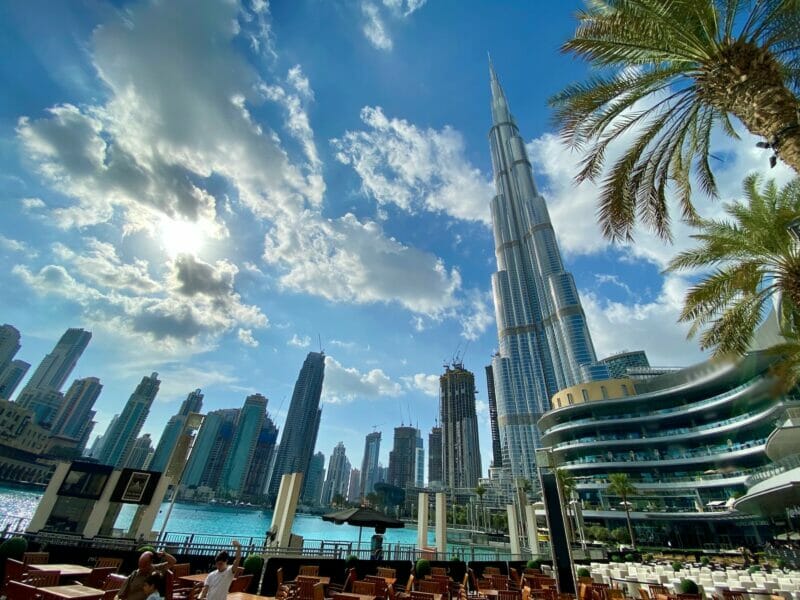
Easy access
The emirate is increasingly accessible, with its major international airport welcoming flights from across the world.
A sunshine-blessed climate
The climate in the emirate for eight months of the year is perfect. Long hot days are dominated by cloudless blue skies and enhanced with beautiful warm seawater.
Outstanding sports activities
There are more sports and sports clubs closely concentrated together within the emirate than anywhere else in the world!

World-class educational facilities
The educational standards in Dubai are excellent, and International educational institutions have seen considerable investment over the past decade.
No income tax to pay
You can repatriate funds to your home country easily – therefore, you can earn a fantastic salary and build savings for your future.
A good healthcare system
You will enjoy a high-standard healthcare system with many world-class hospitals and medical facilities.
Low rates of crime
The crime rate in the United Arab Emirates is lower than in other industrialized nations. Petty crime, pickpocketing, and handbag or wallet theft are very rare.
More tolerant
Dubai is a more tolerant emirate – tolerant of others’ beliefs and ways of life. It is also one of the most moderate in terms of applying the rules of Islam to everyone’s everyday life.
Foreign residents can buy alcohol, and they are also allowed to eat and drink during the daylight hours of Ramadan.
Excellent public transportation
You’ll enjoy a modern, well-connected public transport system of a high standard featuring buses, taxis, and the Metro. Taxis are very cheap, and the government is investing heavily in the public transportation system.
Domestic help
If you’ve got a busy work schedule that doesn’t leave much time to keep up with the housework, you’ll find it easy enough to get domestic help.
The cons
Bureaucracy
Dubai is a bit of a bureaucratic headache, especially for newly arrived expatriates who have to have licenses and permits for everything.
Get advice and assistance from your employer to ease this initial adjustment period that can put some people off staying in the emirate.
Summers can be too hot
The summer months from June to September are almost unbearably hot and humid, and many expatriates take time off during this period to return home.
It can make it worse if you have children, as they will need to stay indoors in air-conditioned rooms for most of the day.
Traffic jams
The traffic situation in the city can be untenable and impact the lives of those who have to commute or take children to school, etc.
The government’s program of investment in public transport systems is easing the problem, but if you want to take a drive here, it can become a lengthy journey.
It is expensive for families
Housing and schooling are quite expensive. The average annual tuition fees for international schools can range from Dhs 30,000 ($8,167) to 90,000 ($24,500) or even higher.
Meanwhile, the average rent for a family house ranges from Dhs 120,000 to dirham 280,000 ($32,700 – $76,000) per year.
Censorship
There is a certain amount of governmental censorship on films, access to websites, and even the likes of SKYPE. Some residents find this restrictive and frustrating.
Long hours of work
Working hours can be very long, and international companies operating in Dubai, in particular, do tend to expect a lot from their expatriate employees.
Relentless development
Dubai is currently a building site. There are pockets of calm and oases of tranquillity across the emirate, but there is also frenetic and relentless development occurring, which can make life a little tiring and stressful at times.
The city is not exactly the most environmentally friendly place, nor is it the sort of place to live if you want to take long walks in quiet areas.
Things to know before you move
Dubai, UAE, is one of the seven emirates that make up the United Arab Emirates. It is also the name of the main city within the emirate of Dubai.
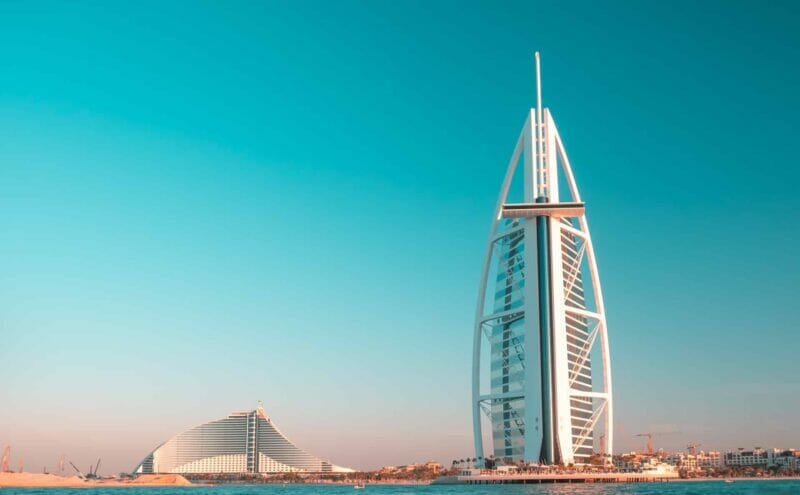
Its wealth has been built on its oil industry, but it has successfully diversified its economy so that today, it has multiple strands supporting its fiscal strength – including tourism, real estate, financial services, medical services, and education.
His Highness Sheikh Mohammed bin Rashid Al Maktoum is the ruler of Dubai, and together with Abu Dhabi, the emirate has veto power over certain matters of national importance in the country’s legislature.
As a result, foreign buyers can own the freehold title to certain properties in Dubai – this is not the case in all other emirates within the Emirates.
The currency code for the UAE Dirham is AED and is commonly abbreviated as Dhs or Dh.
Adjusting to culture shock
Here are some facts that you need to know before moving:
- Adultery is a crime punishable by prison and subsequent deportation – as is getting into debt and even bouncing a cheque.
- Never drink and drive, and never take non-prescribed drugs.
- Respect the dress code, and dress conservatively.
- It’s a Muslim country, respect the local religion and traditions, and appreciate that during Ramadan, you should not eat or drink during the hours of daylight in view of local people – it is deeply disrespectful.
Knowing and following laws and rules in Dubai is key to your well-being in the country.
Major changes introduced in the UAE legislation
In 2020, the government introduced several changes to the rules with the aim of boosting the country’s economic and social standing.
Here are the changes that have the most profound effect on the expatriate community:
The so-called ‘honor killings’ and harassment of women aren’t treated leniently any longer.
Drinking alcohol without a license is permitted.
Living together outside of marriage is no longer illegal.
Expatriates in the Emirates can follow their home nation’s law on divorce and inheritance.
Foreign investors, except for the energy and hydrocarbons, telecommunications, and transport sectors, can fully own local companies without needing an Emirati sponsor.
Final thoughts
Dubai is truly an intoxicating place with the potential for an unprecedented lifestyle. From its iconic Burj Khalifa Tower to its man-maid islands, it is a true world-class vision of a futuristic, forward-looking city that still holds onto a conservative tradition that you will have to accept.
It could be the perfect place to call home if you’re the type of person who thrives on buzz and excitement and looks for a vibrant social life.
No doubt, Dubai as a destination is a personal choice. Some people love it, and some people hate it.
However, what’s certain is that if you can love it, you can save an incredible amount of tax and potentially build much more wealth than you ever could back home!
You might find useful:
- Working In Dubai – how to find a good job in the Emirate
- Dubai Rules & Laws Explained – what to expect and how not to get in trouble
- Healthcare In Dubai – a complete guide to the healthcare system and how to navigate it
- Living In Doha Vs. Dubai
- Didn’t find what you were looking for or need further help? Comment with your question below, and we will do our best to help.
Helpful resources:
- The residence permit for working for a foreign employer on the government site.
- All about Dubai public transport, including planning your journey and topping up your NOL Card on the Road and Transport Authority site.
- Professional levels of jobs in the Emirates – check your skills level before applying for a permit.
- Check the latest Dubai travel updates, including medical requirements and coronavirus, on the Visit Dubai site.
- Dubai Golden Visa – government site.
14 comments
Natalya
Hi! What rights do expat women have when divorcing in Dubai? Is it true that a child can be taken away from them? Where i can read about it? Thanks
Ola Williamson
Hi Natalya, Expat Woman site has a good guide on legalities and divorce rights in the UAE
Rejina bomjon
How to apply students visa in Dubai
Ola Williamson
Hi Rejina, your Dubai university will sponsor your visa. The best way is to contact your Student Recruitment Office at your University; they will guide you through the process.
Izet
Thanks for the valuable info. How long can I stay in Dubai as a visitor? I have EU and US passport
Ola Williamson
Hi Izet,
For US citizens it’s a 30‑day visit visa free of charge stamped upon arrival. For EU – 90 days. Hope this helps.
Sylvanus Okoro
Please how much would be enough for me to process visa to live and work in Dubai in cheap location. Also how long does the visa take to come out. Also the cheapest airlines to fly?
Ola Williamson
Hi Sylvanus,
If you have an employment contract, most of the paperwork will be done by your employer, also most of the costs will be/should be absorbed by the company that employs you.
If you are a freelancer/skilled employee or investor with sufficient income to support yourself, you can apply for the UAE green visa. As a skilled employee you have to show the minimum salary of AED 15,000
As a freelancer, you need to show a minimum of AED 360,000 as your annual income from self-employment for the previous two years.
You can also buy a property in Dubai and that can qualify you for a visa.
Hope this helps.
Vicky Reynolds
Would love to know more about working for the health sector in dubai best hospitals also with a toddler who is 3 please
Achal Abbott
I am a British citizen living in Uk
I have been running convenience store (in Dubai it is known as supermarket ) for last 15 yrs
In uk
I would like to buy a supermarket in Dubai
Please suggest the complete procedure of buying the supermarket
Ola Williamson
Hi Achal, I have sent you the contact details of somebody who could help. If you didn’t receive the email, please, check your spam folder. Good luck
Alain
good to know Grt advice.
Could you please add info? regarding migrated to Emirate as a refugee
is there UNHCR United Nation High Comission for Refugees in place
please can I be advised?
Ola Williamson
Hi, Alain. There’s UNHCR Liaison Office in Abu Dhabi, you can find more information here: https://www.unhcr.org/uk/united-arab-emirates.html
Romain
Very helpful. Thank you